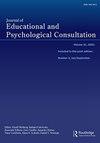通过大学与社区合作推进保护咨询培训
IF 1.1
4区 心理学
Q4 PSYCHOLOGY, EDUCATIONAL
Journal of Educational and Psychological Consultation
Pub Date : 2022-12-15
DOI:10.1080/10474412.2022.2155173
引用次数: 0
摘要
摘要本文介绍了一所大学心理学研究生项目与当地Head Start中心长达数十年的合作伙伴关系所提供的咨询培训经验。该合作提供了一个现场实习环境,初学学生可以在这里参加与一年级课程相关的活动,并为博士生提供一个高级实习场所,他们监督一年级学生的课堂活动,进而由项目教员和中心的特殊服务经理共同监督。通过这些经验,研究生培养了以客户为中心、以咨询对象为中心和系统级咨询的能力,有机会参与一系列与2020年NASP专业标准关键更新相一致的活动,特别是在第六领域(支持安全和支持性学校的服务)、第七领域(家庭、学校和社区合作),八(为不同学生群体提供公平做法)。通过关注学校环境、社区合作、社会正义和公平实践,这些更新的领域突出了生态和系统因素在学校心理学实践和培训中的作用。受训人员支持该中心努力成为一个创伤知情组织,其成员以促进安全、协作、赋权和其他创伤知情实践原则的方式识别和应对创伤。他们通过咨询家长和老师,促进员工在不良童年经历和照顾者压力管理等主题上的专业发展,并促进与家长和老师就创伤知情纪律等问题举行会议来做到这一点。我们讨论了这些活动如何与2020年NASP领域保持一致,并特别关注生态和系统视角。本文章由计算机程序翻译,如有差异,请以英文原文为准。
Advancing Preservice Consultation Training Through University-Community Partnership
ABSTRACT This paper describes consultation training experiences offered through a decades-long partnership between a university school psychology graduate program and a local Head Start center. The collaboration provides a field placement setting where beginning students engage in activities tied to first-year coursework, and an advanced practicum site for doctoral students who oversee first-year students’ classroom-based activities and in turn are jointly supervised by program faculty and the center’s Special Services Manager. Through these experiences, graduate students develop competencies in client-centered, consultee-centered, and systems-level consultation, with opportunities to engage in an array of activities aligned with key updates to the 2020 NASP Professional Standards particularly in Domains Six (Services to Support Safe and Supportive Schools), Seven (Family, School, and Community Collaboration), and Eight (Equitable Practices for Diverse Student Populations). By focusing on the school environment, community collaboration, social justice, and equitable practices, these updated domains highlight the role of ecological and systemic factors in school psychology practice and training. Trainees support the center’s efforts to function as a trauma-informed organization whose members recognize and respond to trauma in a manner that promotes safety, collaboration, empowerment, and other trauma-informed practice principles. They do this by consulting with parents and teachers, contributing to staff professional development on such topics as adverse childhood experiences and caregiver stress management, and facilitating meetings with parents and teachers around issues such as trauma-informed discipline. We discuss how these activities align with the 2020 NASP domains, with particular attention to ecological and systemic perspectives.
求助全文
通过发布文献求助,成功后即可免费获取论文全文。
去求助
来源期刊

Journal of Educational and Psychological Consultation
PSYCHOLOGY, EDUCATIONAL-
CiteScore
3.40
自引率
23.50%
发文量
20
期刊介绍:
The Journal of Educational & Psychological Consultation (JEPC) provides a forum for improving the scientific understanding of consultation and for describing practical strategies to increase the effectiveness and efficiency of consultation services. Consultation is broadly defined as a process that facilitates problem solving for individuals, groups, and organizations. JEPC publishes articles and special thematic issues that describe formal research, evaluate practice, examine the program implementation process, review relevant literature, investigate systems change, discuss salient issues, and carefully document the translation of theory into practice.
 求助内容:
求助内容: 应助结果提醒方式:
应助结果提醒方式:


